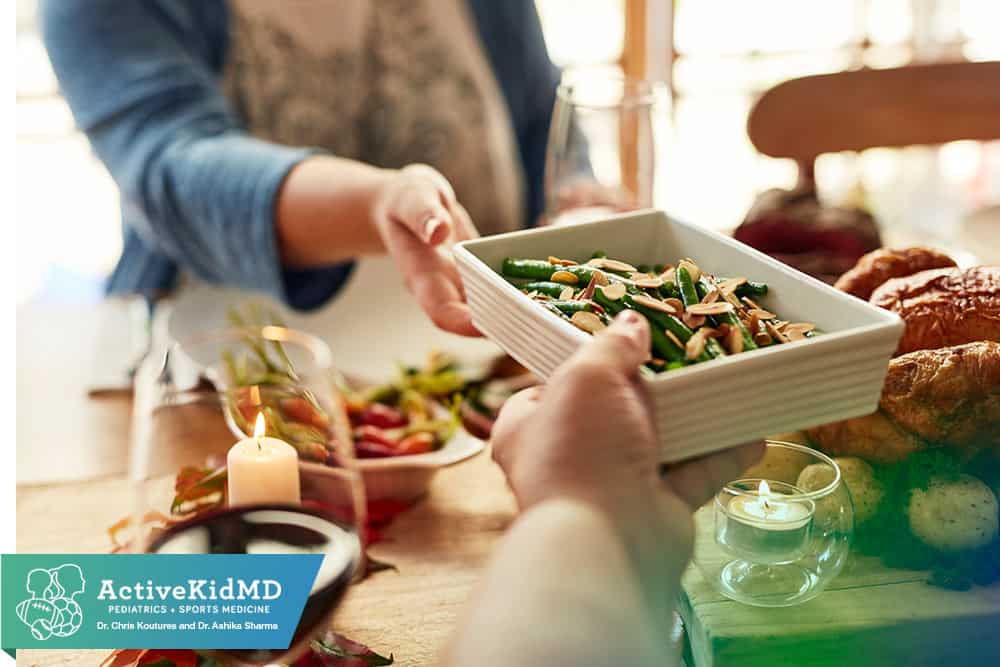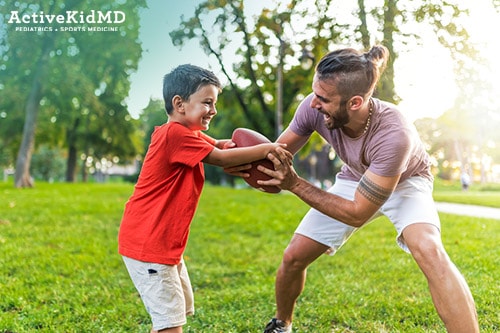Holiday meals are commonly associated with an excessive intake of food and drink. Here are some sensible recommendations for more health-conscious holiday choices, especially when it comes to athletes in your family.
- Involve Children in Meal Preparation: With more school-age children on holiday for the entire week of Thanksgiving and Christmas, there is an increased opportunity to have them assist in food selection and cooking. Have younger children collect more colors (translation: fruits and vegetables) to use in the big meal. Have older children help measure out ingredients and, in the process, learn about the different components of each food. Utilize the help of children to prepare more meals from scratch rather than relying on processed foods, which often contain excessive amounts of salt and preservatives.
- Strike a Solid Balance: Many traditional holiday dishes aren’t perhaps the most nutritious offerings. However, if you try to balance out the table with other selections that are more beneficial for overall health, you can still enjoy the unique offerings of the holiday.
Be Careful with Thanksgiving Morning Football: While playing outside is generally better than just sitting on the couch, trying to imitate your favorite professional heroes, or reliving past glory days can be a health hazard. Too many Thanksgiving meals have been altered by hamstring pulls, sprained knees, or banged up shoulders from seemingly innocent touch football games. Take ample time to warm-up beforehand and playing something less than an all-out football game might keep you from having to sit out later in the day.
- Limit the Pre-Meal Snacking: Leave plenty of room for that holiday feast by reducing pre-meal snacks that might be tasty but commonly are full of unneeded salt, sugar, or unhealthy fats.
- Slow Down and Slim Down at Mealtime: With a bounty of tantalizing foods, many people load up plates with large servings and then hurry through a first course to get to a second (or more) course. Use the size of your fist as a guide for a more proper serving size. Try to slow down between bites and wait for at least 20 minutes before going for another plate. Allowing more time allows for a sense of fullness and reduces the likelihood of overeating.
- Eat to boost your immune system: Vitamin C (commonly found in citrus fruits) can be beneficial for fighting infection, as can other anti-inflammatory items such as fish oil, flaxseed, ginger, and turmeric. Reducing processed foods and high sugar-content foods (can be tough with holiday sweets) can also be good for the immune system.
- Focus on appropriate levels of exercise for your athlete: Remember that moderate levels of exercise (4-5 days a week, 30-45 minutes a day) can support a stronger immune system. While being a couch potato may lead to spending more time on the couch because of illness, not getting necessary time off can also increase sickness risk. Young athletes with busy fall seasons might benefit more from some well-placed down days than from hitting up additional tournaments or practices.
- Take the Family for a Turkey Walk Off: Speaking of exercise, rather than succumb to that post-Turkey nap, gather up family and friends and go for a brisk walk between meal and dessert. This will help overcome that food coma and give you more energy for the rest of the day.
Shop for Good Fitness: From grocery store runs to finding perfect gifts, shopping trips are another beloved staple of the holidays. While many might covet that prized close parking spot, parking the car farther away and getting in more steps can be a fitness bonus. If you are one to line up for precious Black Friday deals, don’t be afraid to pass the time with exercise (push-ups, air squats, and even balancing on one foot) rather than just sitting or standing around. If you aren’t rushing to a particular sale, take time to window shop for 10-15 minutes before entering stores. Use the stairs instead of escalators or elevators and step up your shopping fitness for all year round.
- Keep regular bedtimes and good sleep habits: During work or school breaks, getting out of usual sleep routines can lead to less sleep and nightmares for the immune system. Younger children with less than 9-10 hours of sleep a night and teenagers with less than 8 hours of sleep are at higher risk for both illness and injury.
- Be Truly Thankful: Part of good holiday health and fitness is the mental and emotional boost that comes from taking time to give appropriate thanks, especially for important people in your life.
For more information on nutrition for athletes, please see https://youtu.be/u69kh2q0w34


 Be Careful with Thanksgiving Morning Football: While playing outside is generally better than just sitting on the couch, trying to imitate your favorite professional heroes, or reliving past glory days can be a health hazard. Too many Thanksgiving meals have been altered by hamstring pulls, sprained knees, or banged up shoulders from seemingly innocent touch football games. Take ample time to warm-up beforehand and playing something less than an all-out football game might keep you from having to sit out later in the day.
Be Careful with Thanksgiving Morning Football: While playing outside is generally better than just sitting on the couch, trying to imitate your favorite professional heroes, or reliving past glory days can be a health hazard. Too many Thanksgiving meals have been altered by hamstring pulls, sprained knees, or banged up shoulders from seemingly innocent touch football games. Take ample time to warm-up beforehand and playing something less than an all-out football game might keep you from having to sit out later in the day. Shop for Good Fitness: From grocery store runs to finding perfect gifts, shopping trips are another beloved staple of the holidays. While many might covet that prized close parking spot, parking the car farther away and getting in more steps can be a fitness bonus. If you are one to line up for precious Black Friday deals, don’t be afraid to pass the time with exercise (push-ups, air squats, and even balancing on one foot) rather than just sitting or standing around. If you aren’t rushing to a particular sale, take time to window shop for 10-15 minutes before entering stores. Use the stairs instead of escalators or elevators and step up your shopping fitness for all year round.
Shop for Good Fitness: From grocery store runs to finding perfect gifts, shopping trips are another beloved staple of the holidays. While many might covet that prized close parking spot, parking the car farther away and getting in more steps can be a fitness bonus. If you are one to line up for precious Black Friday deals, don’t be afraid to pass the time with exercise (push-ups, air squats, and even balancing on one foot) rather than just sitting or standing around. If you aren’t rushing to a particular sale, take time to window shop for 10-15 minutes before entering stores. Use the stairs instead of escalators or elevators and step up your shopping fitness for all year round.